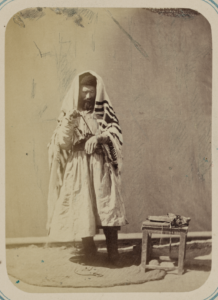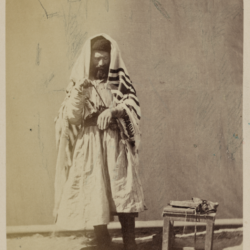In Jewish liturgy, some passages are dəvarim she-bi-qdushah, passages that require public communal prayer. Most famous among these are the Qaddish, Barkhu, and Qədushah. But people are not always able to pray in a community! In liturgical history both ancient and modern many different tashlumim (replacements) for these texts when praying individually have been suggested. The following is the Full Qaddish after Shaḥarit for an individual from Seder Rav ȝAmram, the oldest known full siddur. Much of the content of these tashlumim is from the hekhalot literature or the Gemara, often demonstrating girsaot not otherwise known. The entire midrash provided here is sometimes found under the name “The Feast of the Garden of Eden.”
Note: “The CAUSE” is used to translate the Divine Name YHVH, based on the philosophical idea of God as the Prime Mover and on the interpretation of the Name as a causative form of the copula – “causes to be.” This translation also uses the plural pronouns They/Their/Them to refer to God as a pluralis majestatis, and to avoid the implications of God being assigned a gender. (Find Ibn Ezra’s commentary on Genesis 1:1 for a discussion of the pluralis majestatis when referring to God.) All divine referents (pronouns, epithets, names) are rendered in unicase.
| Source (Hebrew) | Translation (English) |
|---|---|
לֶעָתִיד לָבוֹא מְגַלֶּה הַקָּדוֹשׁ בָּרוּךְ הוּא טַעֲמֵי תּוֹרָה לְיִשְׂרָאֵל. מִפְּנֵי מָה אִסּוּר שְׁתֵּי אֲחָיוֹת? מִפְּנֵי מָה בָּשָׂר בְּחָלָב? מִפְּנֵי מָה בְּשַׂר חֲזִיר? מִפְּנֵי מָה כִּלְאַֽיִם? |
In the future to come, the blessed Holy One will reveal the Torah’s reasoning to Israel. Why the prohibition on marrying two sisters? Why milk and meat? Why swineflesh? Why mixed crops? |
לְאַחַר שֶׁיְּגַלֶּה לָהֶם טַעֲמֵי תּוֹרָה אוֹמֵר לָהֶם לַצַּדִּיקִים הִכָּנְסוּ לְגַן עֵֽדֶן וְאִכְלוּ סְעוּדָה הַמְּתֻקֶּֽנֶת לָכֶם וּשְׁתוּ יַֽיִן הַמְשֻׁמָּר בַּעֲנָבָיו מִשֵּֽׁשֶׁת יְמֵי בְּרֵאשִׁית. אָמְרוּ לְפָנָיו רִבּוֹנוֹ שֶׁלְּעוֹלָם! כְּלוּם יֵשׁ סְעוּדָה שֶׁאֵין בַּעֲלָהּ שָׁרוּי בְּתוֹכָהּ, אֲבָל אִם רְצוֹנָךְ תַּשְׁרֶה שְׁכִינָתָךְ בֵּינוֹתֵֽינוּ! מִיָּד אוֹמֵר דָּוִד לִפְנֵי הַקָּדוֹשׁ בָּרוּךְ הוּא רִבּוֹנוֹ שֶׁלְּעוֹלָם! עֲשֵׂה עִמָּֽנוּ טוֹבָה וְשֵׁב אִתָּֽנוּ. |
After They reveal to them the Torah’s reasoning, They will say to the righteous, “Enter the Garden of Eden and eat a feast prepared for you, and drink wine preserved from grapes from the six days of creation!” They say before Them, “Master of the universe! There is no party where the host isn’t found within! But if you want, let Your presence be among us!” Immediately David says before the blessed Holy One, “Master of the universe! Do good with us and sit with us!” |
בְּאוֹתָהּ שָׁעָה שׁוֹמֵֽעַ הַקָּדוֹשׁ בָּרוּךְ הוּא לְדָוִד שֶׁנֶּאֱמַר אָ֤ז תִּקְרָא֙ וַיהֹוָ֣ה יַעֲנֶ֔ה תְּשַׁוַּ֖ע וְיֹאמַ֣ר הִנֵּ֑נִי. מִיָּד נִכְנַס הַקָּדוֹשׁ בָּרוּךְ הוּא וְדָוִד וְכׇל־הַצַּדִּיקִים עוֹמְדִים עַל־כִּסְאוֹתָם וְהַקָּדוֹשׁ בָּרוּךְ הוּא יוֹשֵׁב עַל־כִּסֵּא כָּבוֹד שֶׁלּוֹ וְדָוִד יוֹשֵׁב כְּנֶגְדּוֹ עַל־כִּסֵּא הַמּוּכָן לוֹ שֶׁנֶּאֱמַר וְכִסְא֖וֹ כַשֶּׁ֣מֶשׁ נֶגְדִּֽי׃ (ישעיה נח:ט) וְכׇל־הַצַּדִּיקִים יוֹשְׁבִים עַל־כִּסְאוֹתָם וְאוֹכְלִין וּשְׂמֵחִים וְשׁוֹתִין כִּשְׁלֹשָׁה כּוֹסוֹת מִיַּֽיִן עָסִיס שֶׁנֶּאֱמַר אַשְׁקְךָ֙ מִיַּ֣יִן הָרֶ֔קַח מֵעֲסִ֖יס רִמֹּנִֽי׃ (שיר השירים ח:ב) וּמוֹזְגִין לָהֶם כּוֹס שֶׁלִּבְרָכָה וְכוֹס שֶׁלִּבְרָכָה הֱוֵי מָאתַיִם וְעֶשְׂרִים וְאֶחָד לֹג שֶׁנֶּאֱמַר תַּעֲרֹ֬ךְ לְפָנַ֨י ׀ שֻׁלְחָ֗ן נֶ֥גֶד צֹרְרָ֑י דִּשַּׁ֥נְתָּ בַשֶּׁ֥מֶן רֹ֝אשִׁ֗י כּוֹסִ֥י רְוָיָֽה׃ (תהלים כג:ה) רְׄוָׄיָׄהׄ בְּגִימַטְרִיָּא הֲכִי הֱוֵי׃ |
At that time the blessed Holy One listens to David, as it is said, “Then you will call and the Cause will answer, you will cry out and They will say ‘Here I am!’” (Isaiah 58:9) Immediately, the blessed Holy One enters with David and all the righteous standing at their chairs, and the blessed Holy One sits on Their glorious throne, and David sits beside Them on a throne prepared for him, as it is said, “And his throne like the sun beside Me” (Psalms 89:37). And all the righteous sit on their chairs and eat and rejoice and drink around three cups of pressed wine, as it is said, “I will have you drink of the spiced wine, of the juice of my pomegranate” (Song of Songs 8:2). And they mix for them the cup of blessing, and the cup of blessing is two hundred and twenty-one lōg, as it is said, “You will set a table before me facing my enemies; You rubbed my head with oil; my cup overflows” (Psalms 23:5). “Overflows” in gematria is thus. |
לְאַחַר שֶׁאוֹכְלִין וְשׁוֹתִין אוֹמֵר מִי יְבָרֵךְ? אוֹמֵר לְאַבְרָהָם, טֹל אַתָּה וּבָרֵךְ, שֶׁאַתָּה אַב הָעוֹלָם! אוֹמֵר לָהֶם, אֵינִי מְבָרֵךְ שֶׁיָּצָא מִמֶּֽנִּי זֶֽרַע שֶׁהִכְעִיס לִפְנֵי הַקָּדוֹשׁ בָּרוּךְ הוּא. |
After they eat and drink, someone says, “Who will bless?” Someone says to Abraham, “You, take it up and bless, for you are the father of the universe!” He says to them, “I cannot bless, for from me came a seed that would aggrieve the blessed Holy One.” |
אוֹמֵר לְיִצְחָק טֹל אַתָּה וּבָרֵךְ, שֶׁנֶּעֱקַדְתָּ עַל־גַּבֵּי הַמִּזְבֵּֽחַ! אוֹמֵר לָהֶם, אֵינִי מְבָרֵךְ שֶׁיָּצָא מִמֶּֽנִּי זֶֽרַע שֶׁהֶחֱרִֽיבוּ אֶת־בֵּיתוֹ שֶׁלַּקָּדוֹשׁ בָּרוּךְ הוּא. |
Someone says to Isaac, “You, take it up and bless, for you were bound upon the back of the altar!” He says to them, “I cannot bless, for from me came a seed that would destroy the blessed Holy One’s house.” |
אוֹמֵר לְיַעֲקֹב, טֹל אַתָּה וּבָרֵךְ, שֶׁמִּטָּתָךְ שְׁלֵמָה לִפְנֵי הַמָּקוֹם! אוֹמֵר לָהֶם, אֵינִי מְבָרֵךְ, שֶׁנָּשָֽׂאתִי שְׁתֵּי אֲחָיוֹת בְּחַיֵּיהֶן, שֶׁעֲתִידָהּ תּוֹרָה לֶאֱסָרָן. שֶׁנֶּאֱמַר וְאִשָּׁ֥ה אֶל־אֲחֹתָ֖הּ לֹ֣א תִקָּ֑ח לִצְרֹ֗ר׃ (ויקרא יח:יח) |
Someone says to Jacob, “You, take it up and bless, for your bed was complete before the Present One!” He says to them, “I cannot bless, for I married two sisters in their lives, which the Torah would later forbid,” As it is said, “And a woman with her sister you will not take as wife to stress” (Leviticus 18:18). |
אוֹמֵר לְמֹשֶׁה, טֹל אַתָּה וּבָרֵךְ, שֶׁקִּבַּֽלְתָּ אֶת־הַתּוֹרָה וְקִיַּֽמְתָּ אוֹתָהּ! אוֹמֵר לָהֶם, אֵינִי מְבָרֵךְ, שֶׁלֹּא זָכִֽיתִי לִכָּנֵס לְאֶֽרֶץ יִשְׂרָאֵל. |
Someone says to Moses, “You, take it up and bless, for you received the Torah and upheld it!” He says to them, “I cannot bless, for I did not merit to enter the land of Israel.” |
אוֹמֵר לִיהוֹשֻֽׁעַ, טֹל אַתָּה וּבָרֵךְ, שֶׁהִכְנַֽסְתָּ אֶת־יִשְׂרָאֵל לָאָֽרֶץ וְקִיַּֽמְתָּ אֶת־הַתּוֹרָה! אוֹמֵר לָהֶם, אֵינִי מְבָרֵךְ, שֶׁלֹּא זָכִֽיתִי לְבֵן. |
Someone says to Joshua, “You, take it up and bless, for you brought Israel into the land and upheld the Torah!” He says to them, “I cannot bless, for I did not merit a son.” |
אוֹמֵר לְדָוִד, טֹל אַתָּה וּבָרֵךְ, שֶׁאַתָּה נְעִ֖ים זְמִר֥וֹת יִשְׂרָאֵֽל, (שמואל ב׳ כג:א) וְאַתָּה נָשִׂיא לָהֶם! שֶׁנֶּאֱמַר וְדָוִ֣ד עַבְדִּ֔י נָשִׂ֥יא לָהֶ֖ם לְעוֹלָֽם׃ (יחזקאל לז:כה) וְהוּא אוֹמֵר לָהֶם, אֲנִי אֲבָרֵךְ וְלִי נָאֶה לְבָרֵךְ! שֶׁנֶּאֱמַר כּוֹס־יְשׁוּע֥וֹת אֶשָּׂ֑א וּבְשֵׁ֖ם יְהֹוָ֣ה אֶקְרָֽא׃ (תהלים קיו:יג) |
Someone says to David, “You, take it up and bless, for you are the sweet singer of Israel (II Samuel 23:1), and their prince! As it is said, “And David My servant is their prince for eternity” (Ezekiel 37:25). And he says, “I will bless, and it is fitting for me to bless!” As it is said, “The cup of salvation I will raise and on the name of the Cause I will call” (Psalms 116:13). |
לְאַחַר שֶׁאוֹכְלִין וְשׁוֹתִין וּמְבָרְכִין מֵבִיא הַקָּדוֹשׁ בָּרוּךְ הוּא אֶת־הַתּוֹרָה וּמַנִּיחָהּ בְּחֵיקוֹ וְעוֹסֵק־בָּהּ בְּטֻמְאָה וּבְטׇהֳרָה בְּאִסּוּר וּבְהֶתֵּר בַּהֲלָכוֹת וּבְאַגָּדוֹת וְאוֹמֵר דָּוִד שִׁירָה לִפְנֵי הַקָּדוֹשׁ בָּרוּךְ הוּא וְעוֹנִין אַחֲרָיו הַצַּדִּיקִים אָמֵן יְהֵא שְׁמֵהּ רַבָּא מְבֹרָךְ לְעָלַם וּלְעַלְמֵי עָלְמַיָּא יִתְבָּרַךְ מִתּוֹךְ גַּן־עֵדֶן, וּפוֹשְׁעֵי יִשְׂרָאֵל עוֹנִין אָמֵן מִתּוֹךְ גֵּיהִנֹּם. מִיָּד אוֹמֵר הַקָּדוֹשׁ בָּרוּךְ הוּא לַמַּלְאָכִים מִי הֵם אֵֽלּוּ שֶׁעוֹנִין אָמֵן מִתּוֹךְ גֵּיהִנֹּם? אוֹמֵר לְפָנָיו רִבּוֹנוֹ שֶׁלְּעוֹלָם! הַלָּֽלוּ פּוֹשְׁעֵי יִשְׂרָאֵל שֶׁאַף־עַל־פִּי שֶׁהֵם בְּצָרָה גְּדוֹלָה מִתְחַזְּקִים וְאוֹמְרִין לְפָנֶֽיךָ אָמֵן. מִיָּד אוֹמֵר הַקָּדוֹשׁ בָּרוּךְ הוּא לַמַּלְאָכִים פִּתְחוּ לָהֶם שַׁעֲרֵי גַּן־עֵֽדֶן וְיָבֽוֹאוּ וִיזַמְּרוּ לְפָנַי! שֶׁנֶּאֱמַר פִּתְח֖וּ שְׁעָרִ֑ים וְיָבֹ֥א גוֹי־צַדִּ֖יק שֹׁמֵ֥ר אֱמֻנִֽים׃ (ישעיה כו:ב) אַל תִּקְרֵי שׁוֹמֵר אֱמוּנִים אֶֽלָּא שֶׁאוֹמְרִים אָמֵנִים׃ |
After they eat and drink and bless, the blessed Holy One brings out the Torah and lays it on Their lap and studies from it about impurity and purity, about prohibitions and permissions, laws and legends, and David says songs before the blessed Holy One and the righteous respond after him, “Amen! May Their great name be blessed for eternity and eternity of eternities! Blessed be!” from the Garden of Eden, and the sinners of Israel respond “Amen!” from the midst of hell. Immediately the blessed Holy One says to the messenger-angels, “Who are those who respond ‘Amen!’ from the midst of hell?” One says before Them, “Master of the universe! These sinners of Israel, who despite their great stress, strengthen themselves and say ‘Amen!’ before You.” Immediately the blessed Holy One says to the messenger-angels, “Open for them the gates of the Garden of Eden, and they will come and hymn before Me!” As it is said, “Open the gates so the righteous nation comes, the faith-keeping” (Isaiah 26:2). Don’t say “the faith-keeping” (shomer emunim) but rather “those who say amens” (she-omrim amenim). |

“תשלום לקדיש שלם אחרי שחרית ליחיד (סדר רב עמרם) | Replacement for the Qaddish Shalem after Shaḥarit for an individual praying alone or without a minyan, from Seder Rav ȝAmram” is shared through the Open Siddur Project with a Creative Commons Attribution-ShareAlike 4.0 International copyleft license.




Leave a Reply